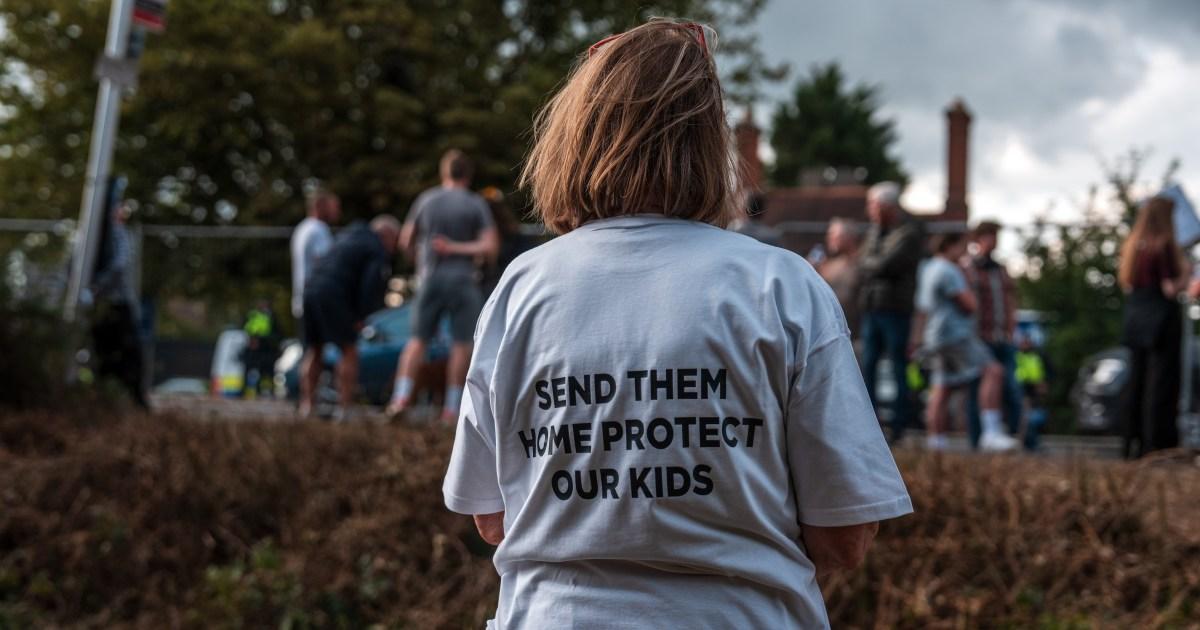Business
Political Protests in Epping Spark Debate on Women’s Safety

Protests in Epping, UK, against the use of a local hotel to house asylum seekers have ignited a contentious debate about the motives behind claims of prioritizing women’s safety. Some participants in these demonstrations have been observed defending controversial figure Andrew Tate, who has faced widespread criticism for his misogynistic views. This situation raises questions about whether the issue of violence against women and girls (VAWG) is being manipulated as a political tool to mask broader anti-asylum sentiments.
Jess Phillips, a government minister, has come under fire for not expressing the same concerns regarding women’s safety as those protesting in Epping. Critics argue that the protests exploit the serious issue of VAWG, potentially using it to justify opposition to asylum seekers and refugees. The parallels to similar strategies observed in other European nations have not gone unnoticed. There are fears that this trend may extend to claims of protecting LGBTQ individuals from asylum seekers, even though some supporters of this narrative have previously backed policies detrimental to the LGBTQ community in the UK.
One reader, known as Alfiaz from London, commented on the irony of using women’s safety as a guise for political agitation that targets marginalized groups. He stated, “It seems they are willing to exploit any marginalized group to advance their political agenda against asylum seekers and refugees.”
The sentiment among Epping protesters suggests a growing perception of a crisis regarding asylum seekers. Some individuals have misidentified charity workers as illegal immigrants, reflecting a wider belief in an ‘invasion’ of asylum seekers. In one instance, a former MP, Rupert Lowe, mistakenly categorized a group of charity rowers as illegal immigrants, illustrating the confusion surrounding the issue.
As the UK grapples with the rising number of asylum seekers, which stood at nearly 110,000 by the end of March, the reality is that these individuals represent less than one per square mile in a country spanning more than 94,000 square miles. With a total population of over 68 million, the likelihood of encountering an asylum seeker on any given day is minimal. Peter Packham, Chair of Leeds for Europe, urged kindness towards asylum seekers, highlighting that fear and racism often overshadow factual circumstances.
In a related discussion, Epping residents have expressed their concerns about local property taxes and government spending. A proposed tax on selling homes, advanced by Chancellor Rachel Reeves, has drawn criticism. Some argue that the tax unfairly labels property owners’ wealth as “unearned,” while others maintain that the property market is driven by demand rather than taxation.
As public discourse continues, the broader implications of these protests and the framing of women’s safety in political discussions remain significant. Critics warn that the use of such serious issues as VAWG for political maneuvering undermines genuine efforts to address violence against women and girls, ultimately harming those the protests claim to protect.
The situation in Epping serves as a reminder of the complexities surrounding immigration, societal safety, and the political landscape in the UK. As debates unfold, the need for a compassionate and informed approach continues to resonate among advocates for both women’s rights and asylum seekers.
-

 Entertainment3 months ago
Entertainment3 months agoAnn Ming Reflects on ITV’s ‘I Fought the Law’ Drama
-

 Entertainment4 months ago
Entertainment4 months agoKate Garraway Sells £2 Million Home Amid Financial Struggles
-

 Health3 months ago
Health3 months agoKatie Price Faces New Health Concerns After Cancer Symptoms Resurface
-

 Entertainment3 months ago
Entertainment3 months agoCoronation Street’s Carl Webster Faces Trouble with New Affairs
-

 Entertainment3 months ago
Entertainment3 months agoWhere is Tinder Swindler Simon Leviev? Latest Updates Revealed
-

 World2 weeks ago
World2 weeks agoBailey Announces Heartbreaking Split from Rebecca After Reunion
-

 Entertainment4 months ago
Entertainment4 months agoMarkiplier Addresses AI Controversy During Livestream Response
-

 Entertainment2 weeks ago
Entertainment2 weeks agoCoronation Street Fans React as Todd Faces Heartbreaking Choice
-

 Science1 month ago
Science1 month agoBrian Cox Addresses Claims of Alien Probe in 3I/ATLAS Discovery
-

 Health4 months ago
Health4 months agoCarol Vorderman Reflects on Health Scare and Family Support
-

 Entertainment4 months ago
Entertainment4 months agoKim Cattrall Posts Cryptic Message After HBO’s Sequel Cancellation
-

 Entertainment3 months ago
Entertainment3 months agoOlivia Attwood Opens Up About Fallout with Former Best Friend





















